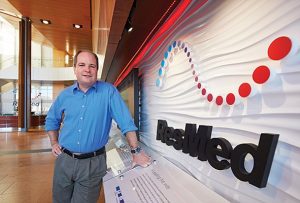Much like a phoenix rising from the ashes of a scorched stock market, ResMed is soaring above the competition with its double-digit global revenue growth and upward trending stock price. It’s a Wall Street darling for both its cash generating units – sleep and respiratory care and SaaS services – and its quick growth sales for items like masks and other medical supplies.
Founded in 1989 by Peter Farell, ResMed was first based in Australia before he moved its headquarters to Sand Diego a year later. The firm made a name for itself in respiratory care, and the company maintains a well-developed product line devoted to helping people breathe better. Its core business comes from its CPAP machines, masks, portable oxygen therapies, and ventilators, and sales are strong in the US, Canada, and Latin America.
While investors may have been initially attracted to the company for its success in marketing medical hardware, it's their SaaS division that's wowing them now. In an October 2019 earnings call, the company shared that its Q1 2020 fiscal revenue totaled $681.1 million, a 16 percent increase from the previous year. Much of that can be attributed to the 83 percent revenue increase from its software-as-a-service division reported in the same quarter.
Since then, ResMed’s SaaS section continues to outperform the market in its second quarter. The firm made a series of acquisitions over the last few years that created a solid subscription-based business that integrates well with its sale of accessories and cloud-connecting smart devices. This strategy builds an ecosystem in which ResMed’s products continue to be a strong foundation while offering a suite of software services that providing a revenue source that is expected to jump up in the double digits.
A challenge that ResMed's products help address is patient compliance with CPAP devices. The healthcare company offers software that can monitor usage and quality of sleep. The feedback from those numbers can encourage patients to continue with their treatment, provide physicians with important information about care, and gives insurance payers confirmation needed for reimbursement.
The company’s focus on digital health technology has been paying dividends in recent months. Both its Brightree and MatrixCare software systems have increased the company’s capacity to oversee 90 million people in the community. Additionally, the company is incorporating the same capability in many of its product lines, including its AirView, myAir, and Propeller. ResMed is also expanding into advanced analytics, machine learning, and machine intelligence – a new area that is expected to grow exponentially in the coming years.
But like any company, ResMed faces its fair share of challenges. In the firm’s fiscal second quarter, device sales declined in France as customers finished upgrading to their new connected products. The healthcare company also faces competitive bidding and reimbursement concerns that will have ramifications for the future.
CEO Mick Farell stated that his company is “driving forward every facet of our business, leading innovation of devices and software that improve health outcomes, creating efficiencies, and reduce overall healthcare system costs. We’re well on our way to improving 250 million lives in out-of-hospital healthcare in 2025.”























